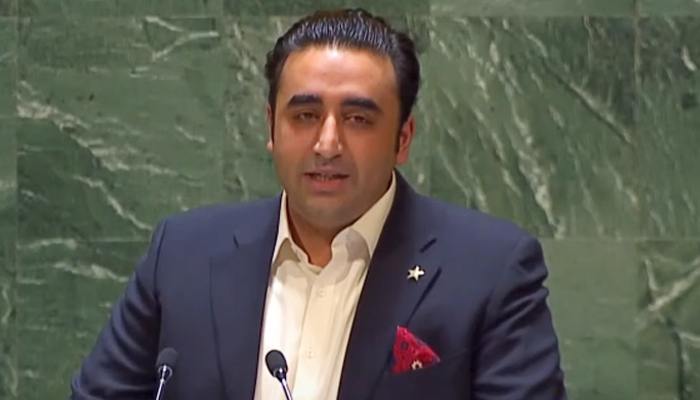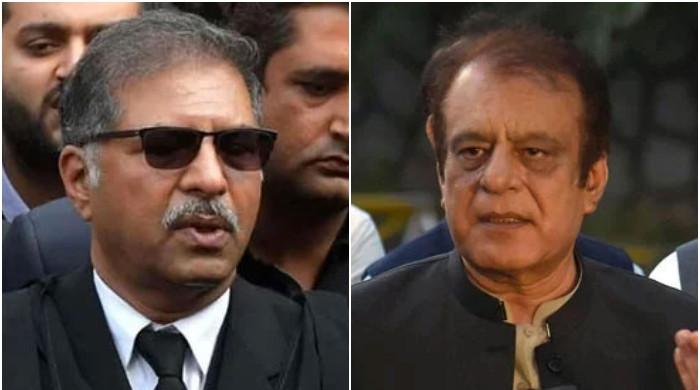At UN, Bilawal says Muslims being targeted through 'fascist policies'
"Hatred is being spread against Muslims under a well-thought-out strategy," foreign minister says
March 10, 2023

- Bilawal says Muslims are being targeted on the basis of their religion.
- "Islam and Muslims are routinely linked to terrorism," FM stresses.
- "Virus of islamophobia spreading faster than we've been able to react."
UNITED NATIONS: Foreign Minister Bilawal Bhutto-Zardari said Friday that Muslims across the world are being targeted through "new fascist policies" as he severely denounced Islamophobia at the United Nations.
The minister's comments came as he opened a special high-level meeting to commemorate International Day to Combat Islamophobia, with a fervent call to everyone — from any religion or creed — to stand together in the fight against hatred, bigotry, and intolerance.
"Hatred's being spread against Muslims under a well-thought-out strategy. Muslims are being targeted because of their religion," the foreign minister stressed, as he noted that the purpose behind bringing matters like hijab into politics is solely to target Islam.
He said that since 9/11, animosity and institutional suspicion of Muslims and Islam across the world escalated to “epidemic proportions”.
"Despite protestations to the contrary," the foreign minister said, "Islam and Muslims are routinely linked to terrorism."
In some cases, he said, the rhetoric of hate and incitement to violence is officially inspired, noting that repeated pogroms of Muslims have been instigated by officially sanctioned neo-fascist policies and ideologies with complete impunity. "The policies and violent actions of those who deny the right of self-determination of Muslim peoples represent the worst manifestations of Islamophobia today."
"Unfortunately," the foreign minister said, "the virus of islamophobia is spreading faster than we have been able to react.
"Not even the greatest democracies are immune. We have witnessed democratic societies expose Muslim bans. So-called free societies allow for the discretion of holy texts and holy sites."
"Even my region is not immune to democratic secular societies under the threat of being transformed into religious and islamophobic states," the foreign minister said.
"Today, we must renew our resolve to build an inclusive society where different cultures and beliefs are celebrated and diversity is embraced. We can ill afford to ignore dangerous ideologies and acts dividing us as humanity," he added.
The declaration of March 15 as an International Day to Combat Islamophobia by the General Assembly is a demonstration of global solidarity with both known and unknown victims of Islamophobia, FM Bilawal said.
Prophet Muhammad (PBUH) taught Muslims to treat everyone with dignity and respect regardless of race, culture, gender or religion, the foreign minister said, but noted that unfounded phobia of Islam and its adherents is a sad reality, and the challenge was deeply rooted.
Since colonial times, he said, the entrenched notions that depict Muslims and their beliefs as cultural “others” and “threats” have served to perpetuate, validate and normalise Islamophobia and anti-Muslim hatred.
"This Islamophobic narrative is not just confined to an extremist marginal propaganda but regrettably, has found acceptance by section of mainstream media, academia, policy-makers and state machinery."
"Islamophobia is therefore being constantly fueled by structural discrimination, xenophobia, and negative stereotyping of Muslims and their faith," he added.
"Today," Bilawal went on to say, "we must renew our resolve to build inclusive societies where different cultures and beliefs are celebrated and diversity embraced. We can ill afford to ignore dangerous ideologies and acts dividing us as humanity."
The meeting is co-convened by the Office of the President of the General Assembly and Pakistan in its capacity as the Chair of the Organisation of Islamic Cooperation (OIC) Council of Foreign Ministers.
Last year, the 193-member Assembly adopted resolution 76/254 designating March 15 as the International Day to Combat Islamophobia.
Csaba Korosi, the assembly's president, UN Secretary-General Antonio Guterres, and High Representative of the UN Alliance of Civilisations (UNAOC) Miguel Moratinos, and others were present at the meeting.
OIC Secretary-General Hissein Brahim Taham and the UN Special Rapporteur on Freedom of Religion or Belief, Nazila Ghanea, were due to address by video link.












